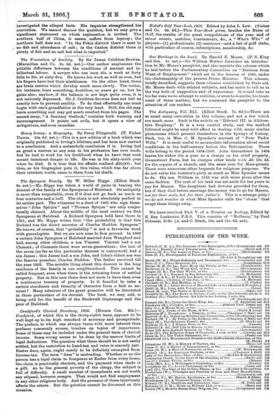The Antiquary, Vol. ILL (Elliot Stock: 7s. 6d.)—There are as
usual many curiosities in this volume, and not a few which are much more. Such is the article on "Edward III. in Allitera- tive Prophecy." It is a very careful study, and the method followed might be used with effect in dealing with many similar phenomena which present themselves in the byways of history. Such, too, is Miss C. H. Spender's, account of "Four Tudor Wills." It is most useful to accumulate information about. social conditions in the half-century before the Reformation. These wills belong to the period 1494-1503. John Greenstreet in 1494 leaves his widow 102. a year as a charge on his chief property, Greenstreet Farm, but he charges other lands with .36 13s. 4d. for the repairs of a Church, and the same sum fbr Mass-priests. There were numerous other bequests for religious purposes. We do not value the testator's piety as much as Miss Spender seems to do. His son William in 1533 was still more pious after the same fashion. The rent of his land was set aside for ten years to pay for Masses. The daughters had dowries provided for them, but if they died before marriage the money was to go for Masses, not for their souls, but for their father's. This is a strange piety ; we do not *ender at what Miss Spender calls the "storm" that swept these things away.










































 Previous page
Previous page